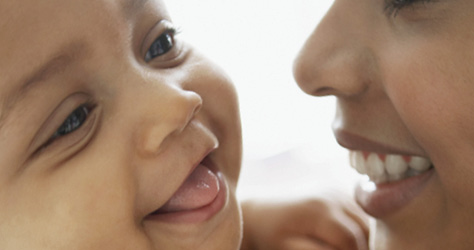What, another cold?
Your baby is probably meeting lots of new people now, especially if they’re at a nursery, but they haven’t yet developed immunity to common infections like colds and coughs. Sometimes, especially in the winter, it can seem like it’s one long wheezathon.
At a glance
- Around now your baby will probably have their second developmental check by the health visitor
- Encourage your baby’s love of books by registering them at the local library
- Take turns to make silly faces at each other: it will make them giggle but also learn about turn-taking

Word search
Dada is often the first word around now (probably because the D sound is slightly easier to say than the M for Mama). Look out for other favourites: dog, duck, ball, shoe and nana. It still counts as a word if it’s not quite right but it’s used to mean the same thing every time, like ‘bah’ for ball. A good way to show them the correct way without deflating their self-esteem is to say, ‘Bah. Yes, that’s right – ball’.
Independence
You may crave the days when your baby was happy to eat the food you chose and hardly noticed when you put their socks on. Now it can seem like every small chore is a re-enactment of the Battle of Waterloo, but it’s actually a good sign they’re showing a desire for some independence. You might just need some new tricks up your sleeve: each having a spoon at mealtimes, giving a ‘choice’ of two healthy snacks so you don’t mind which they choose or distracting them with a completely fake gasp of surprise at the window when it’s sock time. That one always works.
Check-up time
Around now your baby will probably have their second developmental check by the health visitor (it could be any time from 10-12 months). They will check your baby can sit up unaided and see if they’re moving about yet (don’t worry – lots aren’t moving yet). They will also check they can see an object across the room, hold an object and put it in their mouth, pass a toy from hand to hand and make recognisable babbling noises. Don’t be nervous about speaking up if you have any concerns.
How you can help
- Encourage your baby’s love of books by registering them at the local library if you haven’t already. Some have free storytime sessions which your baby may love
- Playing with finger or hand puppets can really promote creativity and imaginative play; you could use an old sock to create your own
- Your baby loves playing with textures – squidging, smearing and mixing (and that’s just with their breakfast cereal). They will love a messy play session with sand or flour or even jelly – even if you don’t relish the prospect quite as much
- Take turns to make silly faces at each other: it will make them giggle but also learn about turn-taking
Game of the month
Homemade den: Create your own soft play centre in the sitting room by draping blankets between chairs, laying duvets on the floor and using cushions as obstacles or opened-out cardboard boxes as tunnels.
Are they normal?
A small note on developmental milestones: it’s really true – all babies are different and although we can encourage them, they will do things at their own pace and in their own time. Read more about baby development anxiety here and our at-a-glance milestones guide here.